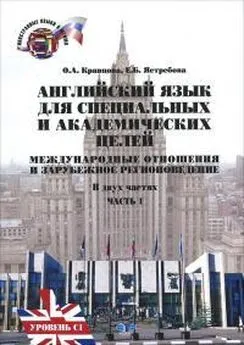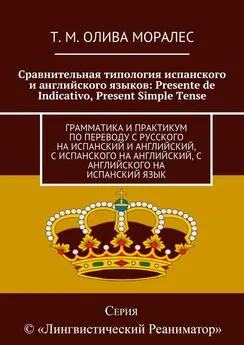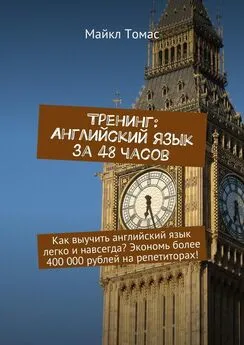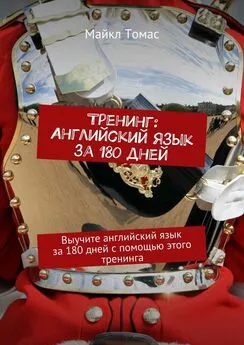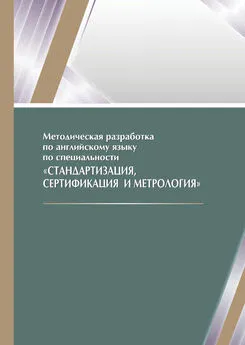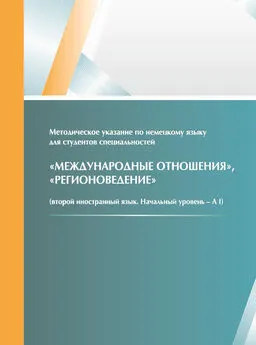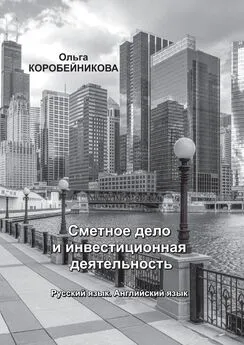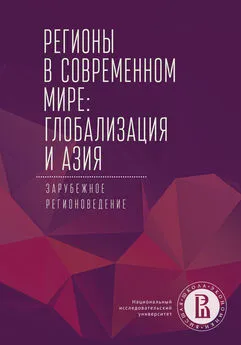Ольга Кравцова - Английский язык для специальных и академических целей: Международные отношения и зарубежное регионоведение. Часть 1
- Название:Английский язык для специальных и академических целей: Международные отношения и зарубежное регионоведение. Часть 1
- Автор:
- Жанр:
- Издательство:МГИМО-Университет
- Год:2015
- ISBN:978-5-9228-1210-8
- Рейтинг:
- Избранное:Добавить в избранное
-
Отзывы:
-
Ваша оценка:
Ольга Кравцова - Английский язык для специальных и академических целей: Международные отношения и зарубежное регионоведение. Часть 1 краткое содержание
Адресовано студентам четвертого курса факультетов и отделений международных отношений и зарубежного регионоведения.
Английский язык для специальных и академических целей: Международные отношения и зарубежное регионоведение. Часть 1 - читать онлайн бесплатно полную версию (весь текст целиком)
Интервал:
Закладка:
Russia is the immediate strategic threat to Europe. Russia is interested not in conquering Europe, but in reasserting its control over the former Soviet Union. From the Russian point of view, this is both a reasonable attempt to establish some minimal sphere of influence and essentially a defensive measure. However, it is a defensive measure that will immediately affect the three Baltic states, which are now integrated into European institutions.
Unit III. EU at the Crossroads
Obviously the Eastern Europeans want to prevent a Russian resurgence. The real question is what the rest of Europe might do — and especially, what Germany might do. The Germans are now in a comfortable position with a buffer between them and the Russians, free to focus on their internal economic and social problems. In addition, the heritage of World War II weighs heavily on the Germans. They will not want to act alone, but as part of a unified Europe.
Germany's position is unpredictable. It is a nation that has learned, given its geopolitical position, that it is enormously dangerous to assert its national interest. In 1914 and 1939, Germany attempted to act decisively in response to geopolitical threats, and each time its efforts ended catastrophically. The German analysis is that engaging in politico-military maneuvers outside of a broad coalition exposes Germany to tremendous danger. Atlantic Europe sees Germany as a buffer against Russia and will see any threat in the Baltics as being irrelevant to their interests. Therefore, they will not join the coalition Germany needs to face the Russians. So the most likely outcome will be German inaction, limited American involvement, and a gradual return of Russian power into the borderland between Europe and Russia.
But there is another scenario. In this scenario Germany will recognize the imminent danger to Poland in Russian domination of the Baltics. Seeing Poland as a necessary part of German national security, it will thus exercise a forward policy, designed to protect Poland by protecting the Baltics. Germany will move to dominate the Baltic basin. Since the Russians will not simply abandon the field, the Germans will find themselves in an extended confrontation with the Russians, competing for influence in Poland and in the Carpathian region.
Germany will find itself, of necessity, both split off from its aggressive past and from the rest of Europe. While the rest of Europe will try to avoid involvement, the Germans will be engaged in traditional power politics. As they do that, their effective as well as potential power will soar and their psychology will shift. Suddenly, a united Germany will be asserting itself again. What starts defensively will evolve in unexpected ways.
This is not the most likely scenario. However, the situation might galvanize Germany back into its traditional role of looking at Russia as a major threat, and looking at Poland and the rest of Eastern Europe as a part of its sphere of influence and as protection against the Russians. This depends partly on how aggressively the Russians move, how tenaciously the Balts resist, how much risk the Poles are willing to take, and how distant the United States intends to be. Finally, it depends on internal German politics.
Internally, Europe is inert, still in shock over its losses. But external forces such as Islamic immigration or Russian attempts to rebuild its empire could bring the old fault line back to life in various ways.
(from The Next 100 Years by George Friedman Anchor Books: New York, 2010)
1. What do you think of G. Friedman's view of Russia's role in the past and future history of Europe?
2. Do you agree with G. Friedman's analysis of Russia's and Germany's intertwined destinies?
3. Which of the scenarios for the future of Europe do you find the more feasible? Can you suggest one of your own?
LISTENING 1
Unit III. EU at the Crossroads
A Brief History of the European Union http://www.youtube.com/watch?v=XgnXwrsMBUs
1. Do you know when the idea of a European Community first appeared?
2. What organisations were the predecessors of the European Union?
3. How many members are there currently in the EU? What countries have acceded to the EU since 2004?
1. What made European countries strive for a union after World War II?
2. What were the successive stages of the EU formation? What was the aim of each?
3. Why were citizens of some European countries, including Britain, unhappy about being within the EEC/EU?
4. What do you learn from the video about the history of the UK-EU relations?
1. What is the procedure of joining the EU nowadays?
2. Do you think any countries are likely to apply for membership in the EU in the near future?
3. What problems has the EU enlargement brought about?
READING 1
1. Are the EU member states developing at the same speed? How many of them are members of the euro-zone?
2. What do you think the notion of a “multi-speed”/ “two-speed Europe” implies? Is it a reality or a concept?
3. Should the more developed countries sign a legally binding agreement giving them power to make decisions independently from the other EU members, what would be the consequences for the Union?
THE DANGER OF A TWO-SPEED EUROPE http://www.ecfr.eu/page/-/ECFR43_REINVENTION_OF_EUROPE_ESSAY_AW1.pdfBy Mark Leonard 44 44 Mark Leonard (born 1974) is a British political scientist, and writer. He founded the European Council on Foreign Relations (ECFR) in October 2007, for which he serves as executive director.
Unit III. EU at the Crossroads
Joshka Fischer, a long-time champion of the idea of two-speed Europe, predicts that the EU will divide into a vanguard (the euro group) and a rearguard (the rest of the 27 EU members): “This formalised division will fundamentally change the EU's internal architecture,” he wrote in July. “Under the umbrella of the enlarged EU, the old dividing lines between a German/French-led European Economic Community and a British/Scandinavian-led European Free Trade Association reemerge.” What Fischer envisages is some kind of legally binding intergovernmental agreement signed by members of the Eurozone outside the scope of the EU treaties (along the same lines as the Schengen arrangement on border-free travel).
An intergovernmental agreement of this kind would allow member states to avoid the pain of ratification in the 27 member states and prevent the 17 from being blackmailed by the renegotiation demands of British Eurosceptics. Even some Eurozone countries such as Slovakia and Finland could be excluded if their parliaments refused to ratify the agreement. However, the paradox of this idea of a “euro-core” is that it could be a kind of federalism without the federalists: it could exclude EU institutions such as the European Commission, the European Parliament and the European Court of Justice (ECJ). Moreover, many of the most pro-European member states — including Poland (which currently holds the presidency), Latvia and Lithuania — would also be left in the slow lane of European integration.
Angela Merkel has said that the fragmentation of the euro would lead to the end of the EU. But, as Wolfgang Munchau has argued, saving the euro could also lead to the destruction of the EU. This danger is in part an institutional question: the inner core that is emerging is breaking some of the elements of the consensus that has allowed the EU to function in recent years. It has sidelined the European Commission, empowered and co-opted the European Council by appointing Jean-Claude Juncker as chair of the group, and has acted through a Franco-German core that does not fully reflect the interests of small member states or the deficit countries.
At the same time, the danger of a two-speed Europe is a policy question. It is inevitable that the “euro-core” will increasingly speak with one voice within the EU as well as outside it. For example, in negotiations on the single market in financial services it is quite likely that the “euro-core” would agree a single position and only then negotiate with the 10 states outside the Eurozone. If an inner core of European states moves forward, the excluded states will be very nervous about ensuring that control of key policy areas such as the single market, common trade policy and the common budget remain with the 27 rather than being decided by the “euro-core”.
Unit III. EU at the Crossroads
There are also big questions about the effects of a two-speed Europe on the other two big integration projects: the common judicial space and common foreign policy. For example, it will be hard for the EU to rise to its potential on the world stage if geopolitically powerful countries such as Britain and Poland are excluded from the core. The implications for justice and legal affairs could be equally profound. Some of the Schengen countries could be excluded from the “eurocore”, but it is possible that countries that have entered a fiscal union with each other might want to unite their migration policies. As David Miliband has argued, a two-speed Europe would be unbalanced on economic issues such as free trade and the single market and foreign-policy issues such as Russia.
This could in turn create a danger of the fragmentation of the EU into informal or even formal alliances and the emergence of geo-economic power struggles within it. There has already been some co-ordination between the Polish presidency, Denmark, Sweden and the UK. Some have suggested that the non-Eurozone states should formally organise themselves into a “Non-Euro Group” (NEG) that would elect its own chair and hold its own summits in order to protect itself from discrimination (in particular, by ensuring that future Council and Commission presidents can still come from non-euro countries). However, unless the Eurozone behaves in an aggressive way, it is unlikely that this group — which includes some states such as Poland that want one day to join the euro, others such as Denmark that haven't yet decided, and others such as the UK that are unlikely to join for the foreseeable future — will cohere into a coalition with shared interests. As well as a lack of cohesion among the “euro-outs”, there is also a lack of cohesion within the Eurozone: one Eurozone minister recently said in private that “the countries we want in the Eurozone like Sweden and the UK are not there and the ones we do not want are.”
In order to avoid the break-up of the EU, attention should be devoted to the relations between the 17 and the 10, as well as to the governance of the Eurozone. It will be important to devise membership criteria that are open so that other countries can join at any time if and when they are willing and able (many Eastern Europeans are keen to make sure they are able to join when they meet the convergence criteria). It will also be important to leave a gateway open for the absorption of the core into the larger union at a later stage. The best outcome would be to develop the two-speed Europe within the existing treaties under the provisions for “enhanced cooperation” 45 45 In the European Union (EU), enhanced cooperation is a procedure where a minimum of nine EU member states are allowed to establish advanced integration or cooperation in an area within EU structures but without the other members being involved. As of February 2013 this procedure is being used in the fields of divorce law and patents, and is approved for the field of a financial transaction tax.
. This would make it possible for non-euro countries to stay in the room when discussions take place and to prevent the “euro-core” formally discussing without them issues that fall within the scope of the existing treaties. This would also keep alive the prospect of a messy Europe of variable geometry rather than a two-speed Europe of first- and second-class states.
Интервал:
Закладка:
